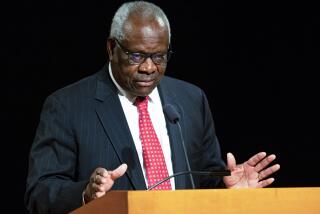His Victories Helped Reinvent America : Marshall’s resignation offers Bush historic opportunity
- Share via
To some Americans, 82-year-old Thurgood Marshall was just another dour-looking Supreme Court justice, the one who stood out in portraits of the court as one of the oldest members and the only African American. But Marshall is much more than that. He is truly a historic figure; he changed this nation in ways that few presidents can claim.
Thurgood Marshall changed, literally, the face of the nation. He did that not only through his presence on the Supreme Court but in his life as one of the most important American lawyers of the 20th Century.
DESEGREGATION: In his most famous victory, he argued the 1954 Brown vs. Board of Education case, which knocked down the “separate but equal” standard, desegregating public schools. Marshall and his team of NAACP Legal Defense Fund attorneys laid the legal foundation on which Dr. Martin Luther King Jr. launched his first major civil rights victory, the seminal Montgomery, Ala., bus boycott. And even earlier, in the 1940s, Marshall and his staff leapfrogged across the country, taking up cases large and small in which there had been violations of the constitutionally protected rights of black citizens, and, by extension, any group discriminated against. Those rights meant that the use of racially restrictive covenants to prevent blacks from buying houses and keep them out of certain neighborhoods was illegal. And those rights meant, Marshall and his attorneys proved, that black teachers should be paid the same as white teachers. These victories formed the legal foundation on which all Americans, regardless of race, ethnicity or gender, now are entitled to equal protection under the law.
Marshall’s legal victories thus helped reinvent America, from a nation that merely espoused liberty and justice for all to one that made those principles stick in the highest courts of the land. Marshall persevered and prevailed because he knew the Constitution was on his side, even if local law and custom were not.
COURT LEGACY: As a justice of the Supreme Court, appointed by President Lyndon B. Johnson in 1967, Marshall was a tireless defender of the rights of the individual. He opposed the death penalty as cruel and unusual punishment because, he said, it has been applied in an arbitrary and discriminatory manner. In recent years, Marshall often, sometimes bitterly, decried the court’s upholding of the death penalty and restrictions on abortion and civil rights protections.
In one 1974 dissent in a Detroit desegregation case, Marshall reflected sadly on “a perceived public mood that we have gone far enough in enforcing the Constitution’s guarantees of equal justice. . . . In the short run, it may seem to be the easier course to allow our metropolitan areas to be divided up each into two cities--one white, the other black--but it is a course, I predict, our people will ultimately regret.”
BUSH OPPORTUNITY: President Bush will nominate the jurist to replace Marshall. What Marshall most strongly represents--what one historian called a firm constitutional vision that is positive in terms of human freedom and dignity--must not be lost from the nation’s highest court. President Bush, says Yale Law School professor Drew Days, “has an opportunity for greatness. . . . If he appoints someone who is not ideologically kindred.” That’s not very likely, of course, but it would reflect that the President does not want to be seen as “stacking” this court.
Marshall is the court’s only black justice; the President must be mindful of the importance of a high court that is representative of all Americans. But a nominee who matches Marshall in race yet bears absolutely no resemblance whatsoever to Marshall’s broad constitutional vision would do little to provide any semblance of balance to a powerful body whose decisions shape the public and personal freedoms of all Americans.
More to Read
Get the L.A. Times Politics newsletter
Deeply reported insights into legislation, politics and policy from Sacramento, Washington and beyond. In your inbox twice per week.
You may occasionally receive promotional content from the Los Angeles Times.










